
Lancet Regional Health-Europe
Scope & Guideline
Unlocking the Future of Health in Europe
Introduction
Aims and Scopes
- Public Health Research:
The journal publishes research that contributes to the understanding of public health issues, focusing on epidemiology, health outcomes, and health equity across diverse populations in Europe. - Health Policy and Systems:
It emphasizes research that informs health policy and systems, aiming to enhance healthcare delivery and effectiveness, especially in response to ongoing health crises. - Chronic Disease Management:
The journal covers studies related to the prevention, management, and outcomes of chronic diseases, with a focus on multimorbidity and the socioeconomic factors influencing health. - Infectious Disease Surveillance:
Research related to infectious diseases, including surveillance, outbreak management, and vaccination strategies, is a core focus, particularly in light of recent pandemics. - Migration and Health:
The journal explores the health implications of migration, addressing the unique challenges faced by migrant populations in accessing healthcare and the impact of health policies. - Environmental Health:
Research on the intersection of health and environmental factors, including climate change, air pollution, and their effects on health outcomes, is a significant area of focus.
Trending and Emerging
- COVID-19 Research and Long-term Effects:
There is a significant increase in studies focused on the impacts of COVID-19, including long-term health consequences and the effectiveness of vaccination strategies, highlighting the pandemic's ongoing relevance. - Health Inequities and Social Determinants:
Research addressing health inequities and the social determinants of health is increasingly emphasized, reflecting a growing recognition of the need to understand and address disparities in health outcomes. - Mental Health and Well-being:
Emerging themes in mental health, particularly concerning the impacts of the pandemic and socio-economic factors, are becoming more prominent, indicating a shift towards comprehensive mental health research. - Digital Health Solutions:
There is a trend toward exploring digital health interventions, including telemedicine and eHealth applications, particularly as a response to the limitations imposed by the pandemic. - Environmental and Climate Health:
Research exploring the health impacts of climate change and environmental factors is gaining traction, reflecting an increasing awareness of the interconnectedness of health and environmental sustainability. - Migration Health:
The health of migrant populations is receiving more attention, with studies focusing on access to healthcare and the unique health challenges faced by these groups, indicating a shift towards inclusive health research.
Declining or Waning
- Traditional Clinical Trials:
There seems to be a decrease in the publication of traditional clinical trial reports, particularly those not directly related to pressing public health issues like COVID-19, as the journal emphasizes real-world evidence and observational studies. - Single-disease Focus:
Research that focuses solely on single diseases without considering the broader context of multimorbidity and social determinants of health appears to be less prevalent, reflecting a shift towards more integrated health approaches. - Historical Epidemiological Studies:
There is a noted decline in the publication of historical epidemiological studies that do not directly inform current public health strategies, as the journal prioritizes contemporary relevance. - Basic Biomedical Research:
The journal appears to be moving away from basic biomedical research topics, favoring studies that have clear implications for public health policy and practice.
Similar Journals
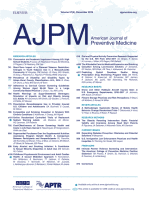
AMERICAN JOURNAL OF PREVENTIVE MEDICINE
Advancing preventive health through rigorous research.AMERICAN JOURNAL OF PREVENTIVE MEDICINE is a premier publication in the fields of Epidemiology and Public Health, published by Elsevier Science Inc. With a commendable impact factor and ranking within the top quartile for both Epidemiology and Public Health categories, this journal serves as a vital source of cutting-edge research, reviews, and critical insights aimed at promoting health and preventing disease. Since its inception in 1985, the journal has been dedicated to disseminating high-quality articles that inform health policy, improve clinical practices, and enhance community health initiatives. It is readily available to researchers and professionals committed to advancing their knowledge and practice, ensuring the continued evolution of preventive medicine. The journal's reach and influence, underscored by its impressive rankings, position it as an essential resource for those looking to make a meaningful impact in the world of preventive health.
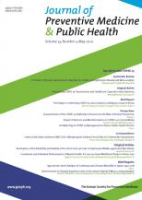
Journal of Preventive Medicine & Public Health
Shaping the future of preventive medicine.Journal of Preventive Medicine & Public Health is a premier peer-reviewed open-access journal published by the Korean Society for Preventive Medicine, dedicated to advancing the fields of preventive medicine and public health. Established in 1968, this journal has carved out a significant niche in the academic community, reflected in its prestigious Q1 ranking in both Medicine (miscellaneous) and Public Health, Environmental, and Occupational Health as of 2023. With a focus on disseminating high-quality research, the journal serves as an essential platform for researchers, professionals, and students to share innovative findings and discuss contemporary challenges in health prevention strategies. The journal maintains a strong commitment to accessibility, offering open access to its content since inception, ensuring that critical research is readily available to the global community. The Journal of Preventive Medicine & Public Health not only contributes to the scientific discourse but also plays a pivotal role in shaping public health policies, making it an invaluable resource for anyone invested in the health sciences.
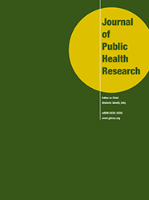
Journal of Public Health Research
Exploring the intersection of research and public health policy.Journal of Public Health Research is a leading open-access journal published by SAGE Publications Inc., dedicated to advancing the field of public health. Since its inception in 2012, the journal has significantly contributed to the dissemination of knowledge in public health, environmental, and occupational health domains, ranking in the Q2 category in the 2023 Scopus metrics, with an impressive percentile of 59th among its peers. The journal aims to publish innovative research that explores critical health challenges and policy implications, fostering interdisciplinary collaboration among researchers, practitioners, and students. With an ISSN of 2279-9028 and an E-ISSN of 2279-9036, it is universally accessible, ensuring that vital findings reach a global audience. By providing a platform for impactful research set in the rich context of public health, the Journal of Public Health Research plays a crucial role in shaping public health practices and policies worldwide.

Eurosurveillance
Exploring the frontiers of epidemiology and public health.Eurosurveillance is a prestigious journal dedicated to the field of epidemiology, public health, and infectious diseases, published by the European Centre for Disease Prevention and Control since 1996. With an impressive Q1 ranking across various categories, including Epidemiology and Public Health, it consistently stands at the forefront of research dissemination, making it an invaluable resource for researchers, professionals, and students alike. The journal boasts an outstanding reputation, as evidenced by its Scopus rankings, where it ranks in the top 1% to 3% in multiple relevant categories. As an Open Access publication, Eurosurveillance ensures that vital findings are freely accessible to a global audience, fostering collaboration and innovation in the fight against infectious diseases. With a dedicated reach from 2001 to 2024, the journal addresses contemporary challenges in public health and virology, reinforcing its significance in shaping policies and research initiatives across the world.
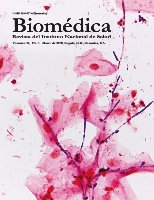
Biomedica
Bridging gaps in biomedical sciences for global impact.Biomedica is a distinguished journal published by the Instituto Nacional de Salud in Colombia, dedicated to advancing knowledge within the fields of biochemistry, genetics, molecular biology, and general medicine. Since its inception in 1981, this Open Access journal has embodied a commitment to disseminating high-quality research, ensuring free and universal access to its published works. With an impressive Scopus Ranking—273rd out of 636 in Medicine and 148th out of 221 in Biochemistry, Genetics and Molecular Biology—Biomedica holds a Q3 category in both disciplines as of 2023, reflecting its growing impact and relevance in the scientific community. The journal welcomes contributions that further our understanding and lead to advancements in healthcare and biological sciences, serving as a critical resource for researchers, professionals, and students alike. The journal operates within a continuous publication model from 2001 to 2024, enriching the academic landscape with contemporary findings and fostering collaboration within the biomedical field.
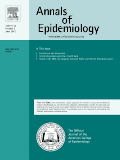
ANNALS OF EPIDEMIOLOGY
Fostering Interdisciplinary Exchange for Global HealthANNALS OF EPIDEMIOLOGY, published by Elsevier Science Inc, stands as a leading journal in the field of epidemiology, with an impressive impact factor that reflects its significant contribution to public health research. With an ISSN of 1047-2797 and an E-ISSN of 1873-2585, the journal has been at the forefront of disseminating high-quality, peer-reviewed research since its inception in 1990. It is consistently ranked in the first quartile (Q1) for epidemiology in 2023, occupying the 29th position out of 148 in the Scopus Medicine category, with a percentage ranking in the 80th percentile. The journal aims to provide a comprehensive platform for the interdisciplinary exchange of pioneering epidemiological studies, exploring diverse health issues and their societal impacts. Researchers, professionals, and students alike will find valuable insights and innovative methodologies within its pages, making it an essential resource for anyone engaged in the study and application of epidemiology. Its headquarters located in the United States (STE 800, 230 Park Ave, New York, NY 10169) further reinforces its influence in the academic community.

JOURNAL OF EPIDEMIOLOGY AND COMMUNITY HEALTH
Empowering communities with vital epidemiological insights.JOURNAL OF EPIDEMIOLOGY AND COMMUNITY HEALTH, published by the esteemed BMJ PUBLISHING GROUP, stands as a leading journal in the fields of Epidemiology and Public Health. With an impressive impact factor and ranking in the Q1 quartile for both Epidemiology and Public Health categories as of 2023, it significantly contributes to the dissemination of critical research that shapes public health policies and practices globally. The journal has been a vital resource since 1978, continuously providing an academic platform for the latest advancements and discussions pertinent to community health, environmental concerns, and epidemiological studies. Researchers, professionals, and students alike depend on this influential publication for rigorous peer-reviewed articles, thereby enhancing its reputation as one of the top journals in the field. Despite the absence of Open Access options, the journal's scholarly contributions are evident, making it indispensable for anyone engaged in public health and epidemiological research.
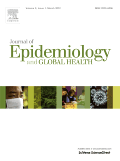
Journal of Epidemiology and Global Health
Unlocking the potential of open-access research for a healthier world.The Journal of Epidemiology and Global Health (ISSN: 2210-6006; E-ISSN: 2210-6014), published by SpringerNature, stands as a premier open-access platform in the field of epidemiology, dedicated to advancing our understanding of global health challenges since 2011. Based in Switzerland, this journal is recognized for its significant contributions to the discipline, achieving an impressive Q1 ranking in Epidemiology and positioning itself at the 88th percentile within the Scopus Medicine - Epidemiology category. With a goal to disseminate innovative research and foster dialogue among scholars, public health professionals, and students, the journal provides a rich repository of empirical studies, reviews, and theoretical contributions that address pressing epidemiological issues. Its commitment to open access ensures that vital research is freely available to the global community, thereby amplifying its impact and relevance. Researchers seeking to publish and access high-quality, peer-reviewed articles will find the Journal of Epidemiology and Global Health an invaluable resource in navigating the ever-evolving landscape of public health.

Central European Journal of Public Health
Exploring Health Dynamics Across Central EuropeThe Central European Journal of Public Health, ISSN 1210-7778 and E-ISSN 1803-1048, is a vital academic forum published by the NATIONAL INSTITUTE OF PUBLIC HEALTH, Czech Republic. With its comprehensive coverage of contemporary issues in public health and medicine since its inception in 1993, this journal aims to bridge the gap between research and practice, fostering a deeper understanding of health dynamics within Central Europe and beyond. As a Q3 ranked journal in both the fields of Medicine (miscellaneous) and Public Health, Environmental and Occupational Health as per 2023 metrics, it provides an accessible platform for innovative studies, policy analyses, and reviews that contribute to the global discourse on public health challenges. Though primarily based in the Czech Republic, it welcomes contributions from a worldwide audience, enhancing its scope and impact. Researchers, practitioners, and students will find invaluable insights that not only enrich academic scholarship but also inform effective public health interventions.

Preventing Chronic Disease
Championing open access to vital health discoveries.Preventing Chronic Disease (ISSN: 1545-1151, E-ISSN: 1545-1151) is a premier open-access journal published by the CENTERS FOR DISEASE CONTROL & PREVENTION in the United States. Since its inception in 2004, this journal has played a vital role in disseminating research focused on the prevention of chronic diseases, offering insights into innovative public health strategies and policies. With a strong commitment to advancing health knowledge, it has achieved a notable impact factor that reinforces its significance—ranking in the Q1 category for both Health Policy and Public Health, Environmental, and Occupational Health as of 2023. With Scopus rankings placing it in the top 13% and 16% in its respective categories, Preventing Chronic Disease serves as a crucial platform for researchers, professionals, and students dedicated to combating chronic conditions. The journal's open-access model ensures that its valuable findings are accessible to a wide audience, fostering collaboration and innovation in public health research and practice.